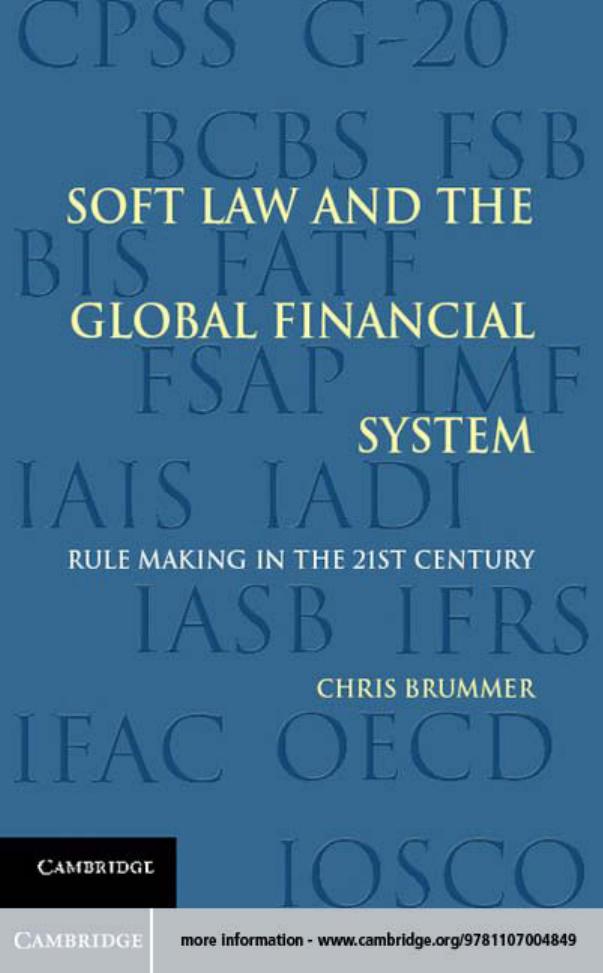Soft Law and the Global Financial System RULE MAKING IN THE 21ST CENTURY 1st edition by CHRIS BRUMMER ISBN 0521181674 978-0521181679
$70.00 Original price was: $70.00.$35.00Current price is: $35.00.
Instant download Soft Law and the Global Financial System RULE MAKING IN THE 21ST CENTURY CHRIS BRUMMER after payment
Soft Law and the Global Financial System RULE MAKING IN THE 21ST CENTURY 1st edition by CHRIS BRUMMER – Ebook PDF Instant Download/Delivery: 0521181674, 978-0521181679
Full download Soft Law and the Global Financial System RULE MAKING IN THE 21ST CENTURY 1st edition after payment

Product details:
ISBN 10: 0521181674
ISBN 13: 978-0521181679
Author: CHRIS BRUMMER
The global financial crisis of 2008 has given way to a proliferation of international agreements aimed at strengthening the prudential oversight and supervision of financial market participants. Yet how these rules operate is not well understood. Because international financial rules are expressed through informal, non-binding accords, scholars tend to view them as either weak treaty substitutes, or by-products of national power. Rarely, if ever, are they cast as independent variables that can inform the behavior of regulators and market participants alike. This book explains how international financial law “works” – and presents an alternative theory for understanding its purpose, operation, and limitations. Drawing on a close institutional analysis of the post-crisis financial architecture, it argues that international financial law is often bolstered by a range of reputational, market, and institutional mechanisms that make it more coercive than classical theories of international law predict. As such, it is a powerful, though at times imperfect tool of financial diplomacy, and poses novel opportunities and challenges for the evolving global economic order.
Soft Law and the Global Financial System RULE MAKING IN THE 21ST CENTURY 1st Table of contents:
-
Introduction: Soft Law in Global Financial Regulation
- Definition and role of soft law in the financial system
- Differences between hard law and soft law
- The increasing importance of soft law in global financial rule-making
-
The Evolution of Global Financial Regulation
- Historical overview of financial regulation
- Key developments in financial regulation since the 20th century
- The role of international financial institutions (IFIs) and regulatory bodies
-
What Is Soft Law?
- Characteristics and features of soft law
- How soft law differs from traditional legal norms
- The functions of soft law in global governance and financial regulation
-
Global Financial Governance and the Role of Soft Law
- Soft law’s impact on international financial regulation and governance
- The relationship between state actors, private actors, and international organizations
- Case studies of global financial governance involving soft law
-
Soft Law Instruments in the Global Financial System
- Common forms of soft law (e.g., codes of conduct, guidelines, standards)
- Examples of soft law instruments in finance (e.g., the Principles for Responsible Banking, Basel III guidelines)
- How soft law complements or supplants hard law in financial regulation
-
The Role of Non-State Actors in Soft Law Rule-Making
- The influence of private sector institutions and NGOs in shaping financial regulation
- The rise of public-private partnerships in rule-making
- The importance of self-regulation and industry standards
-
The Relationship Between Soft Law and National Legal Systems
- How soft law is incorporated into domestic legal frameworks
- The interaction between international soft law and national regulation
- Case studies of countries adopting soft law principles
-
Soft Law and Financial Market Stability
- The role of soft law in promoting financial stability and preventing crises
- Examples of soft law in the aftermath of the 2008 financial crisis
- Assessing the effectiveness of soft law in ensuring market stability
-
Enforcement and Accountability of Soft Law in Financial Markets
- Mechanisms for enforcing soft law rules and guidelines
- Accountability in the context of soft law: Challenges and solutions
- The role of monitoring and compliance in global financial rule-making
-
Criticisms and Challenges of Soft Law
- Arguments against the use of soft law in global finance
- The challenges of legitimacy, transparency, and accountability
- Concerns about the potential for regulatory arbitrage and gaps in enforcement
-
The Future of Soft Law in Global Financial Regulation
- Emerging trends in soft law and the financial system
- The evolving role of international organizations and financial institutions in soft law creation
- Prospects for the further integration of soft law in financial rule-making
-
Conclusion: The Role of Soft Law in 21st-Century Financial Systems
- Recap of the key themes in the book
- The future of global financial regulation in an increasingly complex world
- Final thoughts on the sustainability and potential of soft law in financial rule-making
People also search for Soft Law and the Global Financial System RULE MAKING IN THE 21ST CENTURY 1st :
what is the global financial system
how does the global financial system work
financial soft landing
banking and financial law
soft law in financial supervision
Tags:
CHRIS BRUMMER,Soft Law,RULE MAKING,Global Financial


